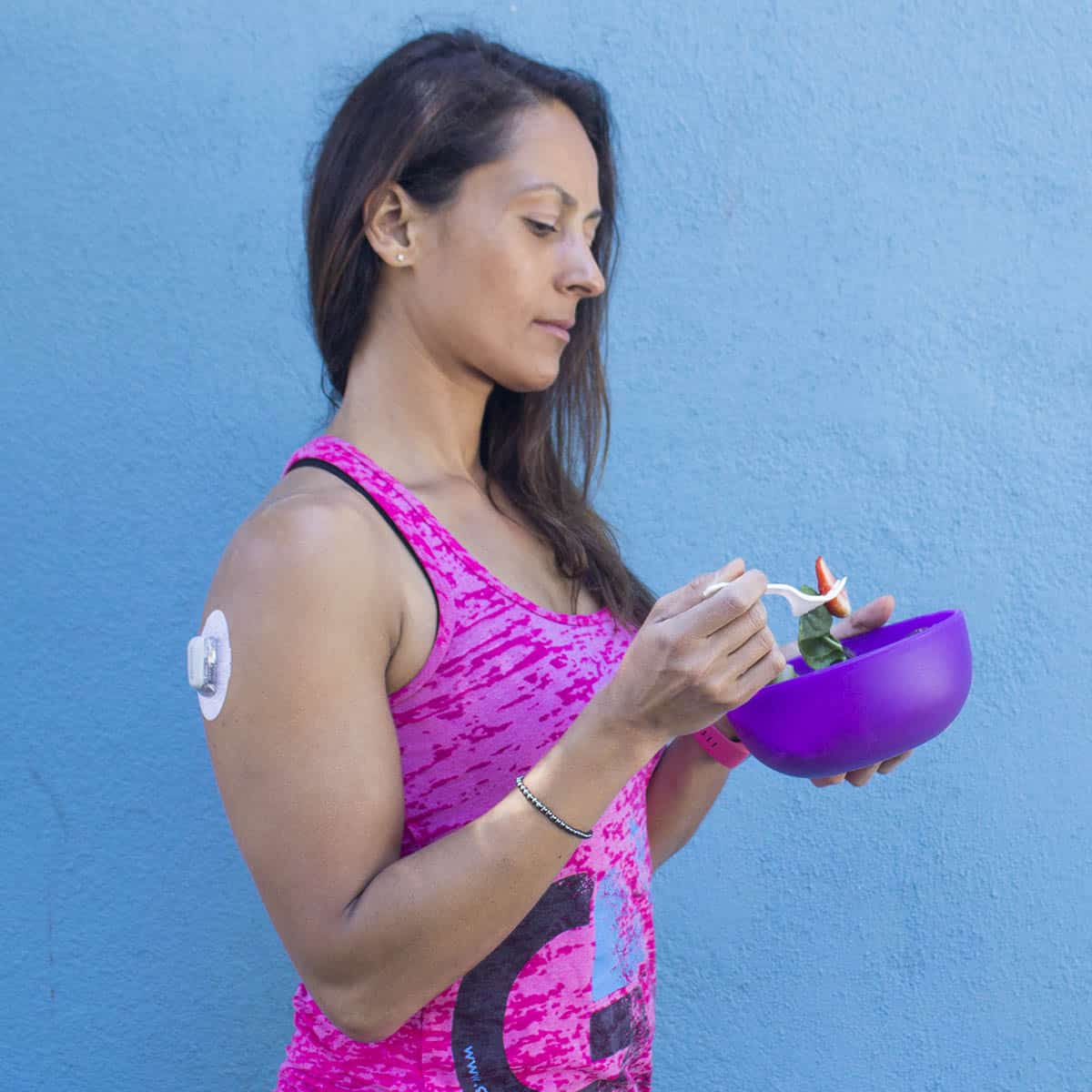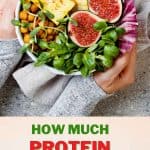A few weeks ago, I wrote a post about how to find your daily calorie needs. The logical next question (which many of you asked) is: How many of these calories should come from protein, carbs, and fat respectively?
In this post, I will explain what calories and macronutrients are and give my recommendation on how much of each to eat when you live with diabetes.

Calories
Calories are a measure of energy. There are roughly 3,500 calories in a pound of fat, meaning that if you burn 3,500 calories more than you eat, you will lose a pound.
To build muscle, you need to eat more calories than you burn, so you have spare energy that can be converted to muscle (unless you have substantial fat reserves that can be used for energy).
This is why building muscle and losing fat at the same time is so difficult. Your body prefers to be in either “building” or “burning” mode at any given time.
Traditionally, bodybuilders have solved this by alternating between bulking and cutting cycles, aggressively adding muscle mass (and fat) in the off-season and losing fat before competitions and photo shoots.
However, having your weight fluctuate like this to maximize long-term gains isn’t very practical for most people, who just want to be healthy and look good year-round. This is why I recommend a more balanced approach, where you eat a consistently healthy diet with the right split of macronutrients to both fuel your muscles and avoid gaining unwanted fat.
The recommendations below are based on someone who works out (lifts weights) several times per week, but even if you don’t, you will still benefit from following the guidelines.
Macronutrients (Protein, Carbs, and Fat)
Each macronutrient plays an important role in keeping your body running optimally, so you need all of them in reasonable amounts in your daily diet (even though a lot of fad diets try hard to convince you otherwise).
Protein is the building block for muscles and ligaments and is essential for muscle growth. When you work out (lift weights), you actually damage your muscle fibers slightly. After your workout, your body starts repairing the damaged muscle fibers by fusing them together. This process is what makes your muscles both larger and stronger.
To complete this process, your body needs protein. This is why anyone who lifts weights as part of their workout routine should make sure to eat enough protein. I recommend getting about 40% of your energy (calories) from protein.
Carbohydrates are the main source of quickly released energy for the body. They are not only essential for maintaining your metabolism and overall energy level, but also for your brain functions. This is why I never recommend no-carb diets.
Carbohydrate-rich foods are often divided into two groups based on how quickly the carbs are converted into energy:
- Slow digesting (fibrous) carbs should be the majority of your carb intake, as they will supply a steady level of energy over the day and prevent hunger.
- Fast digesting (starchy or sugary) carbs are primarily for when you need a quick boost of energy to rebuild muscles right after your workout.
I recommend you get around 40% of your energy from carbs, and most of those should be slow-digesting carbs.
Fat is the most energy-dense macronutrient and the slowest to convert into energy. You need a certain amount of healthy fat in your diet for a variety of reasons (to transport vitamins, hormone control, etc.). Any excess dietary fat is stored as fat reserves in the body.
The differences between different fat types is a longer explanation, that will have to wait for another blog post, but as a rule of thumb, try to get the majority of your fats from fish, plants, and eggs while minimizing animal fat.
I recommend you get around 20% of your energy from healthy fat sources.
So how do I use this information?
Now that you know the optimal split between calories from protein, carbs, and fat, it’s time to calculate the actual amounts you need in grams.
Start by calculating your daily calorie need, using the guidelines from this post. Let’s say that you calculated a daily need of 2.000 calories. With a 40/40/20 energy split of protein, carbs, and fat, you would need:
- 800 calories from protein
- 800 calories from carbs
- 400 calories from fat
To calculate the amounts in grams, you divide by how many calories there are per gram in each macronutrient (4 calories/g in protein, 4 calories/g in carbs and 9 calories/g in fat).
For a 2.000 calories diet, your daily amounts would be:
- 800 calories from protein / 4 = 200 g Protein
- 800 calories from carbs / 4 = 200 g carbs
- 400 calories from fat / 9 = 45 g fat
And there you have it! It may seem a little complicated at first, but when you do it step-by-step, it’s actually quite easy to calculate exactly how much protein, carbs, and fat you need in your diet.
Suggested next posts:




Cynthia Patrick
I have been diagnosed as pre diabetic so am making huge changes and just starting to eat like a diabetic. I read and read and read and two weeks ago went with the CDC diabetic guidelines of macros. I chose 45% carbs, 35% protein & 20% fats broken down among 1,600 calories per day (which is my BMR). I was doing that for a solid 2 weeks. Lost a pound each week. Felt decent and not starving. Now I finally had my appointment with a dietician and she is recommending 35% carbs, 25% protein & 40% fats and 1,200 calories. I am on no meds and currently sedentary due to recovering from ankle surgery. Just light short walks currently. Any thoughts on this? Like does either appeal to your way of thinking over the other ?
Christel Oerum
If the recommendation is from a Registered Dietitian (RD) I’d follow the advice. If the advice is not from an RD I would consider getting a second opinion
Cristina
Everything I’ve read basically states diabetics should be following a “low carb” lifestyle. Do you not find this true for yourself?
Christel Oerum
I personally (and I do believe you can successfully manage your diabetes your way if you put in the work) don’t adhere to a set amount of carbs. Yesterday I enjoyed 170 grams and other days I eat less or more. What does make this possible for me is that I manage my diabetes with insulin and I have a good understanding of how, not just carbs but also protein and fats, impact blood sugars. For people managing without insulin, I think food choices, and specifically carb choices are more challenging
Andi
I stumbled onto your article. Almost fate! Been “dieting” for 3 years since my diagnoses of type 2 diabetes. Been slowly gaining, craving, tired and foggy. I am supposed to be on 190 grams of carbs per day and a 1500 cal day diet. It has been close to impossible. Very little energy to even finish my workouts with my trainer. (Although that has stopped due to COVID). I think your plan makes more sense. Going to give this a 100% effort to see if this is what my body needs. Thank you.
Christel Oerum
You’re welcome. We can’t all thrive on the same diet (even the ADA guidelines recognize that now). So try out different approaches and find what’s right for you
Vicky
Hi,
I am type 2 diabetic.
My goal is to byild muscles and weight gain. I use to do workout (heavy weight training) 4-5days in a week.
As per my BMR my daily calorie requirement 2500.
I am very confused with carb intake. Please help me to understand How much carb can I consume which will not impact my sugar level and also should be helpful in my weight training.
Please suggest.
Christel Oerum
How many carbs you can tolerate is highly individual so I can’t give you an exact amount. You might benefit from working with a Registered Dietitian (RD) if you’re looking for individual guidance. If that’s not for you I would approach it with (a structured) trial and error approach. Try different things, measure your blood sugar before and 80-120 min after and see if you get back into range
Patricia ONeill
I am trying to figure out how many carbs, fats, proteins a day I am allowed to have. My Dr. Just diagnosed me with diabetes type 2. He wants me doing low carbs. I weigh 233 and my height is 5-3 And a nutritionist said I should be eating like 1200 calories a day.
Christel Oerum
Since your doctor has given you a specific calorie goal I’d suggest you stick with his recommendation. Since he has specified low carb, I would suggest you ask him what that means since there’s not a universal definition for low carb
Gary luciani
The label on 0% fat milk says 13grams of sugar, 13grams of carbs and 9grams of protein , no fat.
If I use the 4 calories per gram rule it totals 140 calories yet the label says 90 calories.
What’s going on? What am I missing
Christel Oerum
You’re double counting the carbs. Sugar is a carbohydrate so that’s included in the total carb count, which in this case is 100% of the carb count. So the math is 13*4+9*4=88, they are allowed to round up which is how they get to 90 calories
Jessica
I have recently been put on steroids for an auto immune disorder. I have gained around 8lbs since starting them 2 months ago. I have always battled obesity, and finally went from 240lbs down to 164 withing the past 3 years. It is quite a blow to the head and gut that I am now on a medication that will increase my appetite, and weight. I was on the low carb diet to lose the weight (no surgery all naturally done), and I am struggling with the cravings that come along with the steroids. I would like to start up again, but lost all my research that I did years ago and now I am starting from scratch. I am having a hard time finding anything on an 800 calorie diet, and how many carbs I should be consuming to lose the new weight, and more. I would like to try and do 800 calories every other day and 1200 calories on the other days. I will be on the steroids for hopefully only 1 more month. Any suggestions?
Christel Oerum
I don’t recommend doing that low calorie. If you decide to do that I suggest you work closely with a nutritionist to ensure you get the right amount of micronutrients. I would also worry that going with that low calories just will increase your cravings